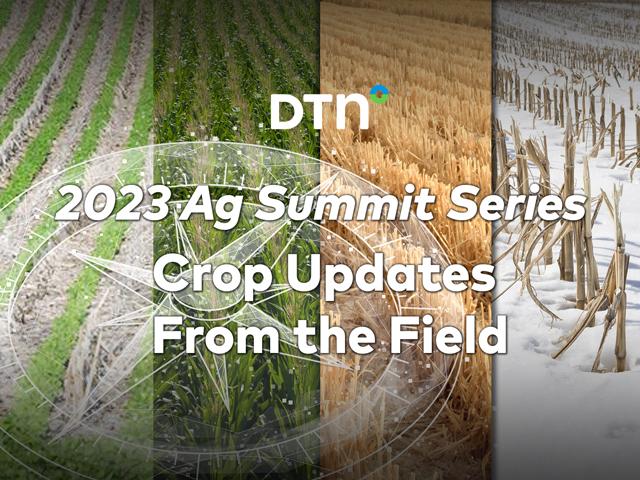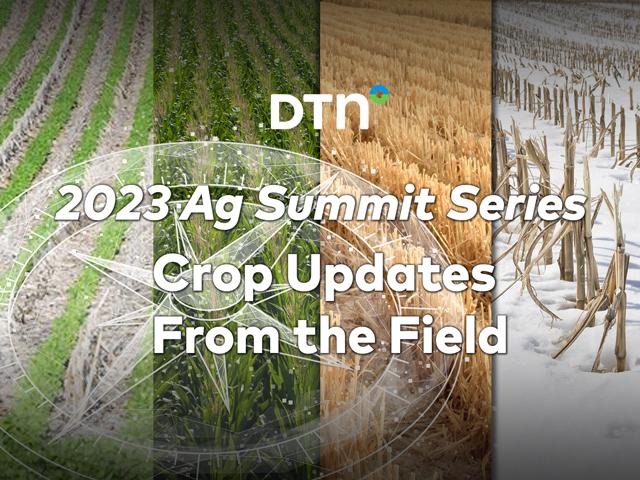Minding Ag's Business
Five Takeaways from the DTN Ag Summit Series and Replay Details
Planters continue to roll across much of the country, and as of Monday, May 22, USDA said 19% of the corn crop and 34% of the soybean crop still needed sowing. The broad, national figures paint a general picture, but whether these crops will hit records, as their expected to, depends on many variables.
One of the most significant variables to producing a record crop is timely planting and good emergence. The second is weather conditions during the growing season. I was honored to host the second of our Ag Summit Series events on Tuesday, where we discussed these topics in-depth.
Farmers from Ohio, Illinois, Iowa, Minnesota, Nebraska and Colorado joined us to share their perspectives on the spring planting season. DTN Ag Meteorologist John Baranick's weather outlook examined the ways El Ninos historically impact weather in the growing season, and DTN lead analyst Todd Hultman pulled it all together in his outlook for the grain markets.
Here are my Top 5 takeaways:
P[L1] D[0x0] M[300x250] OOP[F] ADUNIT[] T[]
1. Many farmers, especially in the Eastern Corn Belt, are planting soybeans earlier. If they only have one planter, a lot of beans are going in first as farmers wait for ideal corn planting conditions. Others start planting simultaneously. Some of the farmers we spoke to mentioned snow or frost after bean planting, but added that it didn't seem to hurt emergence too significantly. However, an early May storm that dropped buckets of rain over southern Minnesota and parts of Iowa caused topsoil to form a crust, and those areas will likely see some replanting of both corn and soybeans.
2. Retail prices of fertilizers, pesticides and other chemistries are coming down. While that's a good thing for farmers' budgets, especially as they pursue higher yields to make up for what prices lack, it also means growers need to be extra communicative with their retailers. Illinois Fertilizer and Chemical Association president KJ Johnson told us that retailers are reluctant to carry much inventory given these price movements, and that means growers need to let their retailers know what products they'd like to use with enough lead time for their retailers to make sure they have it in stock.
3. EPA revised the label for dicamba in several states, moving the application cut-off date to June 12 or when the soybean reaches the v4 growth stage, whichever comes first. Farmers that got an early start to the planting season, like some in central Illinois, may reach that growth stage limitation first. You can find more here: https://www.dtnpf.com/…
4. Whether it's classified as a Super El Nino or not, it's likely to be a strong one. Baranick explained that El Nino generally creates favorable growing season conditions, but with its onset during the summer months, its impact will likely be in the form of highly variable conditions, which are generally called "normal." It could help improve conditions in the Plains, but this summer alone won't be drought-busting. Here's Baranick's most recent posting on the topic: https://www.dtnpf.com/…
5. It's likely that 2023 will be the Year of the Hedger, as Colorado farmer Marc Arnusch called it. The spring rally many plan on didn't materialize this year, and the best pricing opportunities may be in the past. This year's crops are forecasted to break records, and if they do, the higher supplies will weigh on prices. There are questions about demand as well, especially with Brazil poised to take over as the world's largest corn exporter this year and soybean crush margins fading. This could be a year when farmers receive crop insurance payments based on the decline in prices, even if they don't suffer a yield loss.
Of course, I learned a whole lot more than this. If you missed it, there's still time to access a full recording, either to watch on a rainy day or listen to as you go about finishing planting, fieldwork, etc. After you register, you'll be able to play the recording. Here's the link: https://whova.com/…
Katie Dehlinger can be reached at katie.dehlinger@dtn.com
Follow her on Twitter at @KatieD_DTN
(c) Copyright 2023 DTN, LLC. All rights reserved.






Comments
To comment, please Log In or Join our Community .